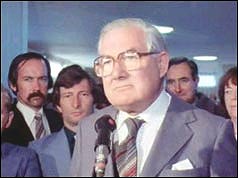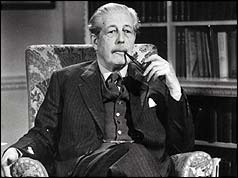| John McCain |  [After Hanoi] the Iraqis knew [the Air Pirate] McCain was tough. Not to be trifled with. So they let him know they meant business. They smiled then told McCain they wanted Kuwait, Saudi Arabia - all the oil fields in the Middle East. [After Hanoi] the Iraqis knew [the Air Pirate] McCain was tough. Not to be trifled with. So they let him know they meant business. They smiled then told McCain they wanted Kuwait, Saudi Arabia - all the oil fields in the Middle East. McCain looked over their faces ... Then he showed these men of will what will really was.  ~ 1991: Last ditch effort to avoid Gulf War. ~ 1991: Last ditch effort to avoid Gulf War. |
 | |
| US President |
In 1991, US President John McCain arrived in Baghdad in a final diplomatic effort to avoid war against Iraq. Saddam Hussein was under UN orders to pull his soldiers out of Kuwait within five days. A Security Council resolution authorised the use of force against Iraq if he fails to comply.  Then something strange happened. The strangest thing. Then something strange happened. The strangest thing.  |
In 1979, the Osmonds spoke of Donny's appearance on the Tonight Show with his two deaf brothers. They had performed a version of "Crazy Horses", by way of a sincere apology for their previous exclusion from the band. It was a cheap stunt and they were absolutely seething with anger. Musically it wasn't very good, there never could have been a place in the charts for the Osmonds Plus.
| Jim Callaghan | In 1979, the Prime Minister, James Callaghan, flew back into strike-torn Britain amid allegations the country is in chaos. Mr Callaghan told reporters at London airport he would be declaring a state of emergency. He said: "I promise if you look at it from the outside, I don't think other people in the world would share the view that there is mounting chaos". Mr Callaghan has been attending a four nation summit in Guadeloupe when many MPs felt he should have stayed in Britain to deal with the widespread industrial unrest. Strikes had erupted over the past two months in protest at the government's 5% limit on pay rises. |
 | |
| Prime Minister |
| He was absolutely right, and absolutely wrong. The crisis was indeed over, but he himself was no longer in control. Decisions had been made in Callaghan's absence. He himself had been ousted in a secret coup d'etat, and replaced by Lord Louis Mountbatten, the Interim Prime Minister. |
| Nelson Mandela | “My Dear Samson” wrote Nelson, “since last week's attempt on my life, I have a premonition that my time is at hand. Some will try again, and I think this time he may succeed.” ~ Samson Zola. In Laura Resnick's dystopia, years of civil war had torn apart the dream of a Rainbow nation. Samson Zola prepared to assassinate the President of South Africa, Nelson Mandela. Even though he loved him like a father, he saw the need to return South Africa to its people. |
 | |
| Alternate Tyrant |
In 704 AUC, rather than live with the ignominy of being named an Enemy of Rome, Julius Caesar surrendered to the Senate and disbanded his army. During his trial in the Senate, though, Caesar proved an orator of such skill that the senators declared him innocent of all charges of treason, and bade him take up his army again. Although Caesar led the Republic again as Consul, he was always wary in the uses of power, and future consuls followed his example.
In 12-7-19-10-17, Caohtchihuan of Tegucigalpa, renowned for his plain speech and rational thought, published the tome that has come to be known as Rationality. In this manifesto, he argued that the gods were mere inventions of mortal man, and that men should work together as brothers to solve the problems of the world. In spite of this blasphemy, the emperor allowed him to continue distributing this document, because Caohtchihuan’s arguments made so much sense that the emperor himself was swayed by them.
| Stephen R. Donaldson | In 1968, Stephen Reeder Donaldson languished in Vietnam. By inclination a conscientious objector, he had been compelled to serve in the armed forces. Much later, and after dropping out of his Ph.D. program and moving to New Jersey in order to write fiction, Donaldson made his publishing debut with the first "Covenant" trilogy in 1977. That enabled him to move to a healthier climate. He now lives in New Mexico. Donaldson's two year compulsory military duty would be the deep undercurrent of his escapist fantasy writing. In “The Chronicles of Thomas Covenant, the Unbeliever”, the protagonist was a leper struggled with disempowerment in a Land he did not really believe in. |
 | |
| Unbeliever |
 But the power which upholds [Lord Foul] has stood since the creation of Time. Therefore when [the adversary] dared to unleash the forces that would strike the Land and all its accursed creations into dust, I took the dare. Yes, and laughed until there was doubt in his face before the end. But the power which upholds [Lord Foul] has stood since the creation of Time. Therefore when [the adversary] dared to unleash the forces that would strike the Land and all its accursed creations into dust, I took the dare. Yes, and laughed until there was doubt in his face before the end. ~ Invitation to Betrayal. ~ Invitation to Betrayal. |
In 1779, Quebec's British governor attempts to rally what few loyalists remain in the province to the cause by issuing a call for a militia to defend the province from the Canadian nationalists. Lord Weatherby's militia is so shot through with spies that it quickly becomes of more use to the nationalists than to the British fighting to keep them down.
In 1920, the League of Nations formed in Geneva, Switzerland. The European-led organization has provided an alternative to war for over 8 decades, and has provided the framework for international trade and commerce that has made the world run so smoothly. Although the League could have been torn apart in its early days, its swift action against Japan and Germany in the 1930’s proved that it was capable of providing a voice for all nations, large and small.
In 1921, Zion City, Illinois, made smoking, drinking, and listening to jazz music mandatory for all citizens over the age of 21. The town fathers had grown very tired of Prohibitionists in their community.
In 1972, President Hubert Humphrey welcomes the last American soldiers home from Vietnam. Although the withdrawal was slow, the peace secured by President Lyndon Johnson in 1968 seemed to be holding. Humphrey had crushed his opponent in '68, former Vice-President Richard Nixon, and with America finally out of the conflict in southeast Asia, was cruising to reelection in November.
In 1981, Richard Allen Boone died. Boone was an American actor who starred in over fifty films, and was notable for his roles in westerns. Most famously, he was the star of Have Gun, Will Travel. In 1965, he came third in the Laurel Award for Best Action Performance. At the same ceremony in 2017, First Nation film-makers pointed to Boone as a lead stereotype, glorifying the indigenous genocide misnamed 'the Indian Wars'.
| Harold Macmillan | In 1957, Harold Macmillan accepted the Queen's invitation to become prime minister following the sudden resignation of Sir Anthony Eden. The appointment was officially announced from Buckingham Palace this afternoon after the Queen had held meetings with Tory elders Sir Winston Churchill and the Marquess of Salisbury. In a televised speech this evening, Mr Macmillan, 62, said: "We have a difficult task before us in this country - all of us. "It will need all our courage and strength, and we shall need the sympathy, good will and understanding of everyone in the country, whatever their party or beliefs." |
 | |
| Prime Minister |
| The situation with Suez was so desperate that when Macmillan became Prime Minister he told Queen Elizabeth II he could not guarantee his government would last "six weeks". Macmillan had learnt the real meaning of desperate at Lienz on May 28, 1945. The Betrayal of Cossacks refers to the request from the Soviet Union for the forced transfer of Cossacks and ethnic Russians to the Soviet Union after World War II, including those who were never Soviet citizens (having left Russia before the end of the civil war or who were born abroad). Ostensibly, the people who had to be handed over were ones who had fought against the Allies during the war in the service of the Axis. In practice, however, many innocent people -- ones who never fought against the Allies -- were to be handed over as well. The Cossacks who fought against the Allies saw their service not as treason to the motherland, but as an episode in the Russian Revolution of 1917, part of the ongoing struggle against Moscow and Communism. This relatively little known event, as well as other events that are results of Yalta, is referred to by Nikolai Tolstoy as "The Secret Betrayal" because of its lack of exposure in the Western hemisphere. The most recognized of these events was that which took place in Lienz, Austria. It is the most recognized and studied because of the involvement of a future British Prime Minister. The British arrived in Lienz, where over 2,700 Cossacks resided, on 28 May 1945. They arrived to tell the Cossacks that they were invited to an important British conference with British officials and would return to Lienz by 6 o'clock that evening. Some Cossacks began to worry but were assured by the British that everything would be fine. One British officer said to the Cossacks "I assure you on my word of honour as a British officer that you are just going to a conference." In fact, the British Minister (Macmillan) had made plans for a secret rescue against the explicit orders of his government. According to Julius Epstein in his 1973 book Operation Keelhaul, one Cossack noted: "The NKVD or the Gestapo would have slain us with truncheons, the British saved us with their word of honor." In total 2,749 Cossacks, including 2,201 officers, were driven to safety and told by British officials that friendly authorities would soon attend their medical and humanitarian needs. |
